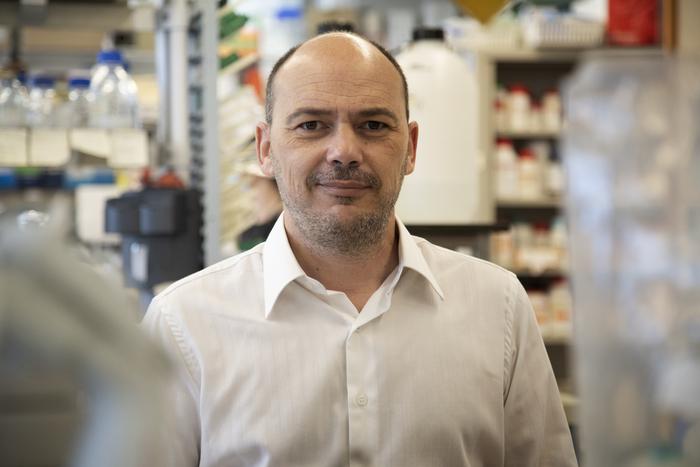The production of antibodies, essential for protecting our body against infections, is very well regulated through the action of a specific subtype of immune system cells, follicular helper lymphocytes. Now, a team led by Luís Graça, group leader at the Instituto de MedicinaMolecular João Lobo Antunes (iMM) and Professor at the Faculty of Medicine of the University of Lisbon, has dedicated itself to the detailed characterization of the functioning of these cells, in an article published today in the prestigious scientific magazine Cell Discovery*, and found that this type of cells can be divided into two groups: cells that promote the production of antibodies to defend against virus infections and cells associated with the production of antibodies involved in defense against parasites and allergies . Understanding the working mechanisms of these two sets of cells could pave the way for the discovery of new therapies for allergy diseases, without affecting the beneficial response of the immune system against infections.

Credit: Gonçalo Ribeiro, iMM
The production of antibodies, essential for protecting our body against infections, is very well regulated through the action of a specific subtype of immune system cells, follicular helper lymphocytes. Now, a team led by Luís Graça, group leader at the Instituto de MedicinaMolecular João Lobo Antunes (iMM) and Professor at the Faculty of Medicine of the University of Lisbon, has dedicated itself to the detailed characterization of the functioning of these cells, in an article published today in the prestigious scientific magazine Cell Discovery*, and found that this type of cells can be divided into two groups: cells that promote the production of antibodies to defend against virus infections and cells associated with the production of antibodies involved in defense against parasites and allergies . Understanding the working mechanisms of these two sets of cells could pave the way for the discovery of new therapies for allergy diseases, without affecting the beneficial response of the immune system against infections.
“We used computational biology techniques to identify the genes that are active in follicular helper lymphocytes involved in the production of both types of antibodies. Taking advantage of artificial intelligence methods, we were able to characterize the genes that are associated with antibodies involved in the response against virus infections or in defense against parasites and allergies”, explains Saumya Kumar, first co-author of the article. “After knowing these data, we used advanced microscopy techniques that allow us to associate information about active genes with the location of cells in the organism. Thus, we discovered that cells with the genes that we identified in the computational models associated with virus infections actually appear when the organism is infected by a virus”, continues Afonso Basto, also first co-author of the article.
“These discoveries define new molecular targets that could be used in the development of therapies to regulate antibody production in diseases such as allergy or autoimmunity. Potentially, they could allow us to reduce the production of antibodies associated with these diseases without reducing the ability to produce critical antibodies against viral infections”, says Luís Graça, about the relevance of the work. “It’s as if until now all these cells were inside a dark bag and when the antibody-mediated immune response was altered, we didn’t know what was happening inside that bag. This work brings these cells into light and allows us to begin to understand how to control the response of each group of cells independently”, he adds.
To be able to develop this work, it was crucial to bring together a team of specialists in medicine, biology and computational sciences, showing the importance of multidisciplinarityand collaboration to understand the functioning of cells in health and disease. In the words of Luís Graça “increasingly, scientific teams are similar to orchestras with specialists that playdifferent instruments”.
Contacts:
Luís Graça Group leader iMM
Email: [email protected]
Helena Pinheiro Science Communication iMM
Email: [email protected]
*Saumya Kumar, Afonso P Basto, Filipa Ribeiro, Silvia CP Almeida, Patricia Campos, Carina Peres, Nadia Pulvirenti, Sarwah Al-Khalidi, Anna Kilbey, Jimena Tosello, Eliane Piaggio, Momtchilo Russo, Margarida Gama-Carvalho, Seth B. Coffelt, Ed W Roberts, Jens Geginat, Helena F Florindo, Luis Graca (2024) Specialized Tfh cell subsets driving type-1 and type-2 humoral responses in lymphoid tissue. Cell Discovery.https://doi.org/10.1038/s41421-024-00681-0
This work was developed at the João Lobo Antunes Institute of Molecular Medicine in collaboration with researchers from the Gulbenkian Science Institute, CIISA – Center for Interdisciplinary Research in Animal Health, the Associated Laboratory for Animal and Veterinary Science (AL4AnimalS), the Research Institute for Medicines (iMed.ULisboa), from the Nazionale di Genetica Molecolare (Italy), from the Institute of Cancer Sciences (United Kingdom), from Cancer Research UK (United Kingdom), from the Institut Curie (France), from the Institute of Biomedical Sciences (Brazil), from BioISI – Biosystems & Integrative Sciences Institute and the Università degli studi di Milano (Italy).
Journal
Cell Discovery
DOI
10.1038/s41421-024-00681-0
Method of Research
Experimental study
Subject of Research
Animals
Article Title
Specialized Tfh cell subsets driving type-1 and type-2 humoral responses in lymphoid tissue
Article Publication Date
4-Jun-2024




